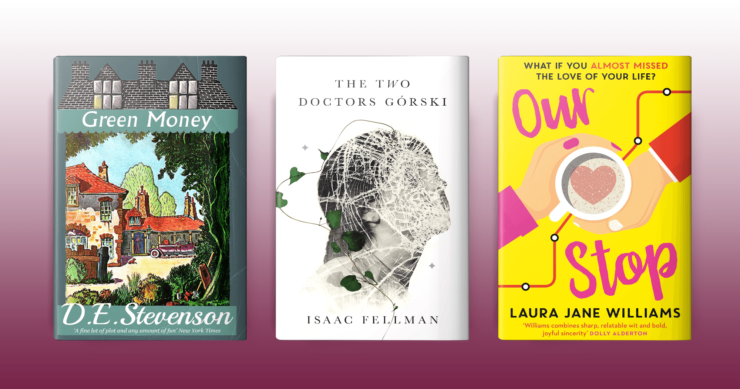It’s a short one this month because April was a great month, spent entirely in Chicago working on the Papal Election of 1492, except for Easter weekend when I went to Minicon in Minneapolis, which was wonderful. I’ve been very busy revising character sheets and writing letters to cardinals and kings in character, and I have only read eight books, and here they are.
Our Stop, Laura Jane Williams (2019)
Romance novel about people who meet on a train. I liked it to start with, but it was doing the whole “people who are utterly perfect for each other who don’t meet until the last page because contingent events keep them apart” thing, and I got tired of it. It felt like an obstacle course. It was sufficiently well written to keep me reading, but really, they should have met fifty percent of the way through the book. In a book like this the reader should be gnashing their teeth at fate, not rolling their eyes.
Jem Sultan: The Adventures of Captive Turkish Prince in Renaissance Europe, John Freely (2004)
Jem, or Cem as he is usually spelled in modern Turkish, was the son of Mehmet II; he started a civil war in the Ottoman empire when his father died and then spent the rest of his life in France and Italy. I was reading this as papal election research, and it’s great—he’s a fascinating larger than life person who stepped between cultures in a very interesting way. He’s reputed to have had a white parrot that could recite verses from the Koran, he did have romantic liaisons across France, and when he and his brother weren’t trying to kill each other they were having poetry competitions. Terrific.
The Pilgrim’s Progress, John Bunyan (1684)
Apparently more copies of this were sold in the American colonies than there were people who could read. It’s hard to see why it was such a best seller. Must have been a zeitgeist thing. It’s an allegory of a spiritual journey, and a fairly heavy-handed one—do Christian and Faithful make it through Vanity Fair? Yes, yes they do. Sorry about the spoilers, but it’s not a book with much suspense. But it is a culturally significant book, and I only had vague memories of reading it as a child—making this technically a re-read, but not in an interesting way. Very Protestant, in a very weird way.
Dangerous Games, Marta Randall (1980)
Sequel to Journey which I read last month, and much more complex, but still really good. Do not start here. A family saga with aliens, spaceships, and planets, but not at all in the way you might expect. Randall is really really good.
Prospero’s Cell, Lawrence Durrell (1945)
This is a travel memoir about the island of Corfu, written during WWII by someone who had to leave it when the war started. This means it has to be compared to Rebecca West’s Black Lamb and Grey Falcon and Peter Leigh Fermor’s A Time of Gifts and it suffers a lot by that comparison. Largely I just don’t like Lawrence Durrell as a person; he’s a smug self-satisfied Englishman who looks on everyone else as kind of local colour, even when he likes them. I believe he really loves Corfu, but I still find him irritating. The author of a travel memoir has to be someone you want to travel with, or it just doesn’t work. Corfu sounds great, however.
No Ex Before Marriage, Portia MacIntosh (2022)
Romance novel in which the heroine finds she was never really divorced, and has to get her ex to sign papers before he remarries. Shenanigans ensue. Both hilarious and the kind of thing that could just about happen. MacIntosh is very funny, and her characters are impressively solid and plausible—even in this kind of nonsense you can see exactly why the characters would do what they do given the circumstances. Surprisingly touching too.
The Two Doctors Górski, Isaac Fellman (publishes Nov. 29th, 2022)
You’ve read books about magic schools, magic universities, now it’s time for magic grad school—and a very realistic and compelling magic grad school it is. I tore through this. The worst things here are not the magical ones but the ones that are all too realistic, the abusive profs, gaslighting, not being able to find a place in a program so you can do your research… I have friends in these situations, and this book is going to be very uncomfortable for them. It’s terrific though, wonderful voice, memorable characters and very interesting metaphysics. Couldn’t put it down.
Green Money, D.E. Stevenson (1939)
Disappointing Stevenson book which is supposed to be funny but derives its humour from the fact that all the characters are idiots. I think this is supposed to be endearing rather than annoying, but it didn’t work for me. My reactions to her are patchy; I like some of her work a lot but have also been disappointed by others.
Jo Walton is a science fiction and fantasy writer. She’s published two collections of Tor.com pieces, three poetry collections, a short story collection and fifteen novels, including the Hugo- and Nebula-winning Among Others. Her novel Lent was published by Tor in May 2019, and her most recent novel, Or What You Will, was released in July 2020. She reads a lot, and blogs about it here irregularly. She comes from Wales but lives in Montreal. She plans to live to be 99 and write a book every year.










